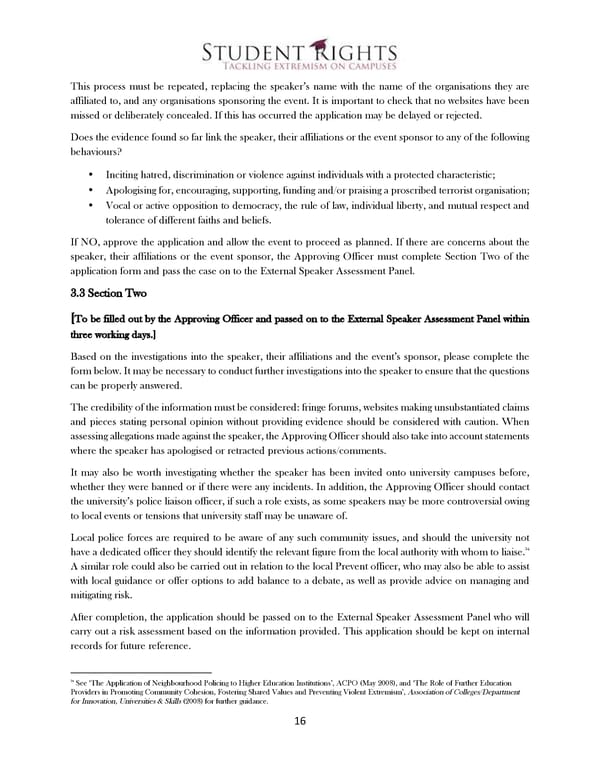! This process must be repeated, replacing the speaker’s name with the name of the organisations they are affiliated to, and any organisations sponsoring the event. It is important to check that no websites have been missed or deliberately concealed. If this has occurred the application may be delayed or rejected. Does the evidence found so far link the speaker, their affiliations or the event sponsor to any of the following behaviours? •! Inciting hatred, discrimination or violence against individuals with a protected characteristic; •! Apologising for, encouraging, supporting, funding and/or praising a proscribed terrorist organisation; •! Vocal or active opposition to democracy, the rule of law, individual liberty, and mutual respect and tolerance of different faiths and beliefs. If NO, approve the application and allow the event to proceed as planned. If there are concerns about the speaker, their affiliations or the event sponsor, the Approving Officer must complete Section Two of the application form and pass the case on to the External Speaker Assessment Panel. 3.3 Section Two [To be filled out by the Approving Officer and passed on to the External Speaker Assessment Panel within three working days.] Based on the investigations into the speaker, their affiliations and the event’s sponsor, please complete the form below. It may be necessary to conduct further investigations into the speaker to ensure that the questions can be properly answered. The credibility of the information must be considered: fringe forums, websites making unsubstantiated claims and pieces stating personal opinion without providing evidence should be considered with caution. When assessing allegations made against the speaker, the Approving Officer should also take into account statements where the speaker has apologised or retracted previous actions/comments. It may also be worth investigating whether the speaker has been invited onto university campuses before, whether they were banned or if there were any incidents. In addition, the Approving Officer should contact the university’s police liaison officer, if such a role exists, as some speakers may be more controversial owing to local events or tensions that university staff may be unaware of. Local police forces are required to be aware of any such community issues, and should the university not 34 have a dedicated officer they should identify the relevant figure from the local authority with whom to liaise. A similar role could also be carried out in relation to the local Prevent officer, who may also be able to assist with local guidance or offer options to add balance to a debate, as well as provide advice on managing and mitigating risk. After completion, the application should be passed on to the External Speaker Assessment Panel who will carry out a risk assessment based on the information provided. This application should be kept on internal records for future reference. !!!!!!!!!!!!!!!!!!!!!!!!!!!!!!!!!!!!!!!!!!!!!!!!!!!!!!!!!!!!! 34 See ‘The Application of Neighbourhood Policing to Higher Education Institutions’, ACPO (May 2008), and ‘The Role of Further Education Providers in Promoting Community Cohesion, Fostering Shared Values and Preventing Violent Extremism’, Association of Colleges/Department for Innovation, Universities & Skills (2008) for further guidance. 16! !
 A Model External Speaker Policy Page 17 Page 19
A Model External Speaker Policy Page 17 Page 19